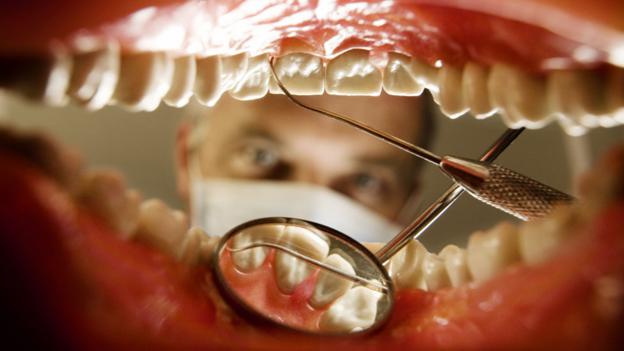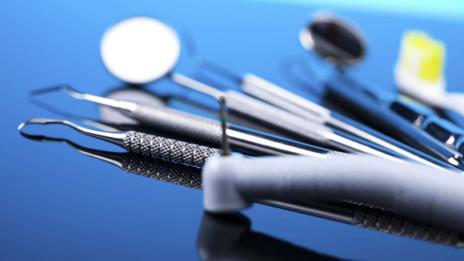How often do you need to see a dentist?

(Getty Images)
Is going to the dentist every six months really necessary for good oral health? Claudia Hammond investigates.
A lot of us think that we should visit the dentist every six months – even if it’s not what we do in practice. Whether those biannual check-ups are really necessary is, however, a matter of debate. In fact, it’s not even clear where the six-month figure initially came from. Some believe it dates back to the 18th Century, long before the advent of randomised controlled trials that could test its benefits.
People with a lot of problems with their teeth do, of course, need to visit the dentist often. But what about everyone else? Permanent teeth are more vulnerable to decay soon after they’ve come through, so when children have just grown their first permanent teeth at the ages of six to eight they need those regular check-ups. In the teens, teeth are less vulnerable, until wisdom teeth come through in your twenties. So the risk varies at different times of life.
In 2000, three-quarters of dentists surveyed in New York were recommending six monthly check-ups, despite the absence of studies examining whether the frequency of visits made a difference to patients at low-risk of tooth decay or gum disease. Today, many organisations such as the American Academy of Pediatric Dentistry still recommend six monthly check-ups.
But for several decades some have been arguing that the choice of six months as the ideal space between visits is rather arbitrary. Back in 1977 Aubrey Sheiham, a professor of dental public health at University College London, published a paper in The Lancet bemoaning the lack of evidence for six monthly check-ups. Almost 40 years on, he’s still making the same point.

(Thinkstock)
In 2003 a systematic review examined the research that had then been done. The results were mixed. Some studies found no difference between the number of decayed teeth, fillings or missing teeth in those who attended the dentist frequently and those who didn’t, while other studies found fewer fillings in those who went a lot. When it came to gums most research found no difference in the amount of bleeding, plaque or gingivitis in permanent teeth. One study found that going to the dentist more than once a year made no difference to the size of tumours at diagnosis with oral cancer, while another found that if people waited more than a year between visits, tumours could be more advanced when they were found.
Last year the Cochrane Collaboration performed a similar systematic review of the research, and they were disappointed with what they found. The quality and quantity of the research was simply too poor to back up or refute the idea of six-monthly check-ups. They found just one controlled study where patients were randomised to attend the dentist either annually or every two years. Those who went annually did better, but it’s possible that the dental staff knew whether patients were in the annual or two-yearly group, which could have influenced the treatment they received and biased the results.
There’s something else we have to bear in mind. Even when a study finds, for example, that children who go to the dentist frequently have fewer fillings, there may be other factors at work. Those same childrenmay have other advantages; they may belong to a higher socio-economic group, eat more healthily and have better quality dental equipment.

(Thinkstock)
There is a secondary purpose to dental visits. Even if the dentist doesn’t spot any problems, they are likely to remind you to keep on caring for your teeth and cleaning them properly – although there’s no consensus about the best way of doing that either.
How often should you visit the dentist, then? Bodies like Nice, which provides guidance for the National Health Service in England and Wales, say that the frequency of dental visits all depends on the individual. They recommend that children go at least once a year because their teeth can decay faster, while adults without problems can wait as long as two years. They even go as far as to say that longer than two years is OK for people who have shown commitment to caring for their teeth and gums. Similar advice is given elsewhere. An expert group reviewing the evidence in Finland back in 2001 recommended that under-18s who are at low risk could visit between every 18 months and two years.
Where does this leave the rest of us the next time we receive a card through the door reminding us our next dental visit is due? We’d all like an excuse to go less often, and the good news is that if you don’t have any problems you can probably wait a little longer than six months between visits. But exactly how long you can wait before your appointment with the dentist’s chair will depend on the assessment you and your dentist make of your individual risk.
If you would like to comment on this article, or anything else you have seen on Future, head over to our Facebook or Google+ page, or message us on Twitter.
Disclaimer
All content within this column is provided for general information only, and should not be treated as a substitute for the medical advice of your own doctor or any other health care professional. The BBC is not responsible or liable for any diagnosis made by a user based on the content of this site. The BBC is not liable for the contents of any external internet sites listed, nor does it endorse any commercial product or service mentioned or advised on any of the sites. Always consult your own GP if you're in any way concerned about your health.
얼마나 자주 치과진료를 받아야 할까?
치아 건강을 위해 매 육개월마다 치과에 가는 것이 꼭 필요할까? 클라우디아 해먼드는 조사했다.
많은 사람들이 실제 실행에 옮기지는 않을지라도 매 육개월마다 치과를 가야한다고 생각한다.그러나, 일년에 두번의 정기검진이 필요한지는 논란의 대상이다. 실제 어디에서 이 육개월이라는 기간이 나왔는지도 의문이다. 일부는 그 이익을 시험할 수 있는 무작위대조군시험이 나타나기 훨씬 전인 18세기에 이 이야기가 나왔다고 믿는다.
물론 치아에 문제가 많이 있는 사람들은 치과를 많이 방문해야 할 것이다. 하지만 다른사람들은 어떨까? 영구치는 나오기 시작했을 때 썩기 쉬우므로 아이들이 6세에서 8세 사이에 영구치가 나기 시작했을 때 정기적으로 방문을 해야할 필요가 있다. 십대의 경우, 이십대에 들어서 사랑니가 나기 전까지는 치아가 좀 덜 취약하다. 그러므로 충치의 발생확률은 인생에 있어서 다른 시기에 따라 다양할 수 있다.
2000년에 뉴욕에 있는 사분의 삼의 치과에서는 방문 빈도가 환자의 충치 및 잇몸질환의 위험도에 차이를 만드는 지에 대한 연구 없이 6개월의 정기검진을 권했다.
오늘날 미국 소아치과의 학계와 같은 많은 단체들에서는 아직도 6개월의 정기검진을 권한다.
하지만 수세기동안 일부의 사람들은 방문에 있어 6개월의 기간이 이상적인 것이 아니라 임의적인 것이 아닌지에 대해서 논쟁해왔다. 1977년 런던대학의 궁중구간보건사업분야의 교수인 오드리 쉬험은 랜싯지에서 6개월 정기검진의 증거 부족에 대해서 한탄하는 논문을 게재했다. 근 40여년간, 그는 아직도 같은 내용을 말하고 있다.
2003년에 체계적인 검토가 이루어졌다. 결과는 혼합적이었다. 일부 연구에서는 치과를 정기적으로 간 사람과 아닌 사람 간에 충치의 수, 치아 메움 또는 소실에 있어 차이가 나타나지 않은 반면 다른 연구에서는 많이 방문한 사람들에게서 더 적은 치아 메움이발견되었다. 잇몸에 관해서는 대부분의 연구가 영구치의 출혈, 플라그 혹은 치은염의 정도에 차이가 없었다. 한 연구는 일년에 두번 치과를 방문하는 것은 구강암의 종양 크기에 차이가 없었다고 밝혔지만, 다른 연구는 치과 진료 간에 일년 이상의 시간을 보낸 사람들의 경우 종양 발견시 더 발전되어 있을 수 있다고 밝혔다.
지난 the Cochrane Collaboration이 연구에 대해 그와 유사한 체계적인 검토를 수행했는데, 그들이 발견한 것에 대해서 실망을 금치 못했다. 6개월 검진에 대해 지지하거나 반박하기에 연구의 품질과 양은 너무 좋지 못했다. 그들은 참여자가 일년 혹은 이년에 한번식으로 무작위로 치과에 가는 통제 연구를 얻었을 뿐이었다. 일년에한번 가는 사람들이 더 나았지만, 치과 직원이 환자가 매년오는 그룹인지 이년에 한번 오는 그룹인지 알 수도 있었다. 이는 그들이 받는 치료에 영향을 줄 수 있었고, 결과에 편향을 일으켰다.
우리가알아야 할 것이 하나 더 있었다. 연구가 치과에 자주가는 아이들이 치아 메움을 좀 덜 가지고 있다는 것을 발견했다고 할 지라도, 작업에 다른 요인이 끼어들 수 있다. 이 아이들은 다른 특권을가질 수 있다; 그들은 사회경제적인 지위를 가진 그룹에 포함될 수 있고, 좀 더 건강한 음식을 먹으며 더 나은 치과 장비를 보유하고 있을 수도 있다.
치과 방문에는 부차적인 목적이 있다. 치과의사가 문제를 발견하지 않을지라도, 그들은 그들의치아에 신경을 쓰고, 제대로 닦는 것-이에 대해서도 어떤 방법이 최선인지 합의는 이루어지지 않았지만-을 상기할 수 있다.
그럼 얼마나 자주 치과를 방문 해야하나? 영국과 웨일즈 국민보건서비스를 위한 안내를 제공하는 Bodies like Nice는 치과 방문의 빈도는 개인에 따라 다르다고 한다. 그들은 문제가 없는 어른들은 2년까지 기다릴 수 있는 반면 아이들은 충치가 빨리 생기기 때문에 최소 일년에 한번은 치과에 가야한다고 권한다. 그들은 또한 위험성이 낮은 18세 이하는 18개월에서 2년 정도 사이에 방문할 수 있고 한다.
우리가 다음에 치과 방문일을 상기시키는 카드를 받을 때 어떻게 해야한다고 알려주는가? 우리는 모두 조금 덜 갈 핑계를 얻고자 하고, 좋은 소식은 당신이 문제가 없다면 다음 방문까지 6개월 이상 기다려도 문제가 없다는 것이다. 하지만 다음에 의사를 방문하는 약속까지 얼마나 기다릴 수 있는가는 당신 개인의 위험도에 대한 당신과 치과의의 평가에 달려있다.
권리포기 각서
이 칼럼의 모든 내용은 일반적인 정보의 목적으로 제공되었고, 의사 및 여타 건강 전문가의 의료 조언을 대신할 수는 없습니다. BBC는 이 사이트의 내용을바탕으로 사용자가 내린 진단에 법적 책임이 없습니다. BBC는 목록에 있는 외부 인터넷 사이트의 내용에 대해서 법적책임이 없으며, 이 사이트에서 언급 혹은 조언된 상업적 제품 및 서비스를 지지하지 않습니다. 건강에 대해서는 언제나 지역 보건의와 상담하세요
통역 및 번역 문의는...
카카오 플러스 친구: https://pf.kakao.com/_sBxnXj
크몽 기술번역 : https://kmong.com/gig/127269
크몽 기술통역: https://kmong.com/gig/127521
'예전포스팅' 카테고리의 다른 글
| 세계 수자원 회의 (4) | 2015.04.10 |
|---|---|
| 동영상음원 추출하기 (0) | 2015.04.10 |
| Human hibernation: Secrets behind the big sleep (0) | 2015.04.09 |
| 수면장애를 겪고 계세요? (0) | 2015.04.09 |
| 수면 관련 좌담회 (0) | 2015.04.09 |


